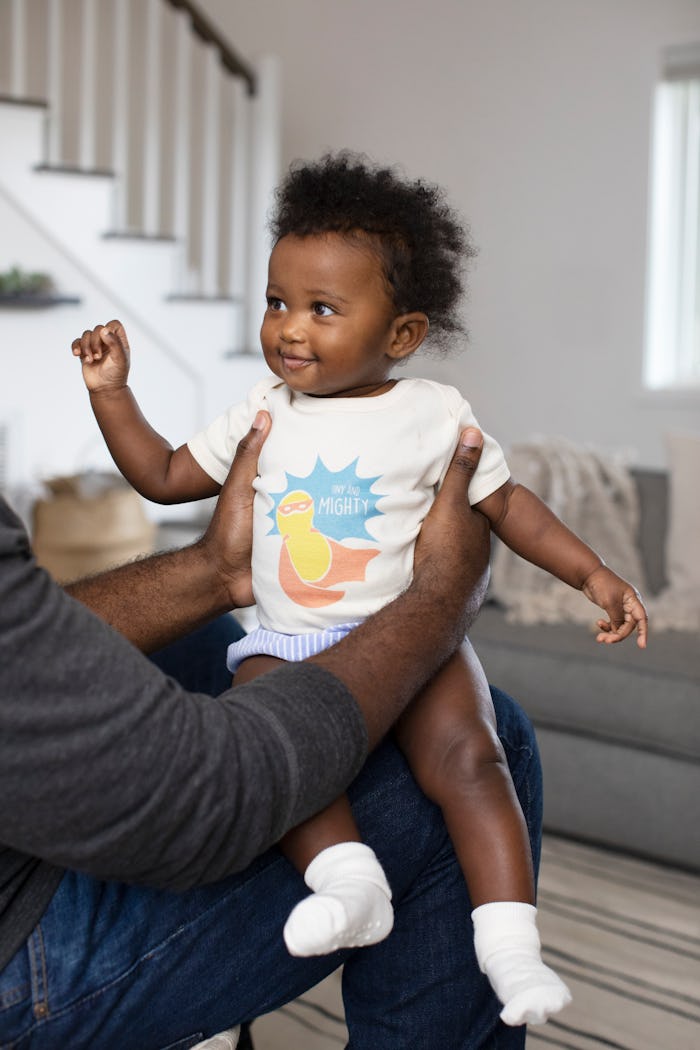Life

These Adorable Onesies Have A Life-Changing Peanut Allergy Message Behind Them
You could say that peanuts have become a kind of edible symbol representing the complexities of modern-day parenting. What started out as a lunchbox staple turned seemingly overnight into an ever-present threat. Pediatricians went from assuming their young patients were subsisting on PB&Js to forbidding parents to feed infants peanut butter before the age of three to the latest guidelines, which involve the introduction of peanut foods at around 4 to 6 months of age (in healthy infants with no allergies). It's a lot to keep track of, so the National Peanut Board, along with partners including the American College of Allergy Asthma and Immunology (ACAAI), is helping to spread the word about the new recommendations with an adorable line of infant clothing called Size 4 to 6 Months.
As the Prevent Peanut Allergies website explains, this shift in thinking around peanut allergies was kicked off when a "groundbreaking study" found that parents of children at risk for peanut allergy could "reduce their baby’s chance of developing a peanut allergy by up to 86 percent by feeding them small amounts of peanut foods as early as 4 to 6 months of age." Released in January 2015, the study led to new guidelines on feeding peanut foods to babies from the National Institutes of Allergies and Infectious Disease (NIAID); since then, the ACAAI, the Food Allergy and Anaphylaxis Connection Team (FAACT), and other medical and allergy groups have endorsed the recommendations.
Essentially, the guidelines fall into three categories. For babies with severe eczema or egg allergies, doctors might want to first run more tests; but once the green light is given, infants in this category "should start eating peanut foods around 4 to 6 months of age and should continue to consume them regularly — 2g of peanut protein, three times per week."
Babies with mild to moderate eczema, on the other hand, should be fed "small amounts of baby-friendly peanut foods, like peanut powder or thinned peanut butter, around three times a week starting when they are around 6 months old," while babies in the "low risk" category of "no eczema or allergies" are free to try peanuts together with other solid foods as often as parents want and "in accordance with family preferences and cultural practices."
It's a lot to remember, right?
That's why the National Peanut Board, the ACAAI and FAACT joined together with L.A.'s Orangeheat to create 10 ridiculously adorable onesies, all "inspired by the reassurance you get from knowing that introducing small amounts of peanut foods around 4 to 6 months can help reduce baby’s chance of developing peanut allergies."
Each bodysuit features peanut feeding instructions on the inside and is made of 100 percent cotton, and the styles are too cute to resist:
Awww! I Peanut You, too, cutie!
That color-blocked peanut is good enough to eat.
A little spoonful of peanut butter makes the medicine go down, right?
Hello!!
All of the above onesies can be ordered from the Prevent Peanut Allergies website for $28. Proceeds from all purchases of Size 4 to 6 Months apparel support the advancement of allergy solutions through a donation to the American College of Allergy, Asthma and Immunology. Money well spent, I'd say!
Editor's note: This post has been updated to clarify that the National Peanut Board spearheaded this campaign.